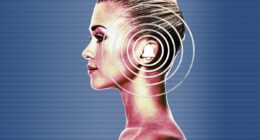
The BA.4 and BA.5 variants developed from the highly contagious Omicron strain and were first recorded in the UK this spring. By May, the UK Health Security Agency (UKHSA) had designated them as “variants of concern”. Now, an estimated 78.7 percent of confirmed Covid cases in England are the BA.5 strain alone.
This means it is now the dominant variant in the country.
One doctor explained how those infected with BA.4 or BA.5 tend to notice breathing issues in a specific area.
Joseph Khabbaza, MD, a pulmonary and critical care physician at Cleveland Clinic, told The New York Times that patients often develop upper respiratory symptoms: “from the vocal cords to the tip of the nose”.
He added that he has seen more patients with painful sinus congestion and severe sore throats, due to the variants.
READ MORE: Asda employee shares red flag skin cancer symptom that led to terminal diagnosis
According to the ZOE health study, the 10 most common symptoms of the BA.4 and BA.5 variants – in order – are:
- Runny nose
- Sore throat
- Headache
- Persistent cough
- Fatigue
- Sneezing
- Hoarse voice
- Unusual joint pain
- Fever
- Chills or shivers.
The ZOE study has been collecting data on the general population throughout the pandemic.
READ RELATED: The Best Instant Pot Deals for Amazon Prime Day Are Here
DON’T MISS
Loss of taste or smell, which had been a common Covid symptom previously, were not listed as the most common symptoms for the variants.
The study also suggests almost five million Britons have symptomatic Covid in the UK right now.
This is significantly higher than the official recorded data from the government which goes by filed test results.
Government statistics report just 150,591 new Covid cases in England between July 7 and 15 – down 14 percent compared to the week before (this data was not available for the other UK countries).
READ MORE: Covid: Simple sleeping position you can try at home to reduce risk of hospitalisation
Other general symptoms of Covid, listed by the NHS, include:
- A high temperature
- A loss or change to your sense of smell or taste
- Shortness of breath
- An aching body
- A blocked nose
- Loss of appetite
- Diarrhoea
- Feeling sick or being sick.
It advises: “Try to stay at home and avoid contact with other people if you have symptoms of COVID-19.”
Source: Daily Express








